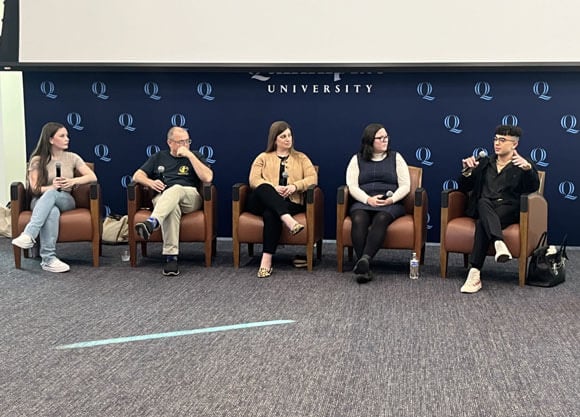
Panel discusses mental health challenges to raise awareness among Quinnipiac community
November 12, 2024

November 12, 2024

The November 7 discussion was the initial talk in the new series “Inclusion Insights: The Disability Experience — Addressing Stigma and Promoting Mental Wellness.” Office of Student Accessibility Director Kate Palumbo and Professor of Psychology Penny Leisring developed the concept for the series and moderated the panel discussion. The next event, coming in February, will focus on neurodiversity.
“It’s really important to raise awareness and to do what we can to support one another,” said Palumbo. “We’re going to start these conversations and today we have a panel willing share their own personal experiences to benefit others.”
Panelists included Alan Bruce, professor of criminal justice; Karla Natale, associate vice president of community partnerships and university events; dual degree and finance major Anthony Amato ’25; Shannon Corbo ’24, a sociology major; and Hannah Freshman ’26, a political science and journalism major.
Leisring, a licensed clinical psychologist, opened the conversation by discussing the scope and prevalence of mental health challenges through the lens of two continuing national studies.
The U.S. Census Household Pulse Survey most recently surveyed 50,000 U.S. adults in August and September 2024 and found that over one in five people had either anxiety or depression in the past two weeks. Among them, the highest rates were demonstrated among 18-to-29-year-olds and marginalized groups.
Leisring also shared some results from the Jed (JED) Foundation, the nation’s leading organization dedicated to young adult mental health. Quinnipiac is a partner JED campus. JED’s 2023-2024 Healthy Minds Study, which gathered over 100,000 college student survey responses, found 38% of college students indicated depression in the past two weeks. Additionally, 34% indicated anxiety, 36% attended counseling within the last year and 31% were being assisted by psychiatric medications in the last year.
“You can see these rates are really high,” said Leisring. “This is a super-important conversation to have.”
Leisring added what some may think they know about mental health diagnoses may only be the tip of the iceberg.
“When you think of depression, you may think about sadness. There’s so much more than just sadness that can make it difficult for individuals,” she said. “And anxiety is so common, but it comes in many different forms. When someone tells you that they’re dealing with anxiety, it can actually mean a lot of different things.”
Asked if there is a certain point when feelings of depression or anxiety rise to levels significant enough to seek assistance, Leisring said it’s common to feel sad or anxious periodically. It becomes more concerning when the level of impact begins to encroach on a person’s ability to function in daily interactions such as work, social relationships or school.
The panelists discussed how they’ve been assisted and shared some of the challenges they’ve faced while also navigating their busy lives.
“It’s a lot of just internal negative thoughts that you have to power through sometimes,” said Freshman. “I think unfortunately, we’re hard on ourselves; because you do want to do better and make the people around you proud.”
Bruce said that he “white-knuckled” through those types of feelings as an adolescent and young adult, when issues of mental health were not as recognized as they are today. He said he experienced what he now recognizes as his first panic attack when he was an undergraduate student.
“I was probably about 35 before I realized you didn’t have to be crippled by anxiety,” said Bruce.
Natale recalled wanting to be “perfect” as a college student.
“It was a lot of just pressuring myself. Nobody else was pressuring me, it was all myself,” said Natale.
“The highest expectation we’ll ever have is the one we’ll for ourselves and mental illness just adds a notch to it,” Amato said. “There’s a value to balancing and not overworking yourself, and also being happy with what you’re able to achieve.”
While the university provides faculty with student accommodation forms, “…it’s really hard for me to give myself permission to miss a class,” said Corbo, who also thanked one of her professors in the audience for being so supportive.
“Whenever I miss a class, it brings me more anxiety, so it’s kind of a slippery slope,” Freshman added. “But it’s definitely important to take those days when you need it and just communicate with your professors. In the experiences I’ve had with my professors, they’ve been very understanding.”
Asked what one thing panelists wished students, faculty and staff could better understand about what it’s like to live with mental health challenges, Freshman said it’s important to know that it doesn’t define a person.
“It’s only a small part of the person’s life. It affects them, but there’s so much more to them than that,” said Freshman.
Corbo and Bruce said it would be helpful if all community members would recognize that anyone can be going through mental health challenges at any time.
“Realize everybody you are interacting with is dealing with a whole background story that you know nothing about,” said Bruce.
Natale said her recommendation involves one word, “kindness.”
Palumbo encouraged students to access The Office of Student Accessibility for resources, support and assistance. Offices are located in Arnold Bernhard Library's north wing and North Haven Campus — SLE 340. Additionally, the Quinnipiac community is encouraged to take advantage of counseling services and the university’s many health and wellness resources; all of which are available within the Recreation and Wellness Center on the Mount Carmel Campus.
“If you’re feeling like any of this speaks to you, please come be friends with us. We are all here to support you,” said Palumbo.
Quinnipiac Today is your source for what's happening throughout #BobcatNation. Sign up for our weekly email newsletter to be among the first to know about news, events and members of our Bobcat family who are making a positive difference in our world.
Sign Up Now